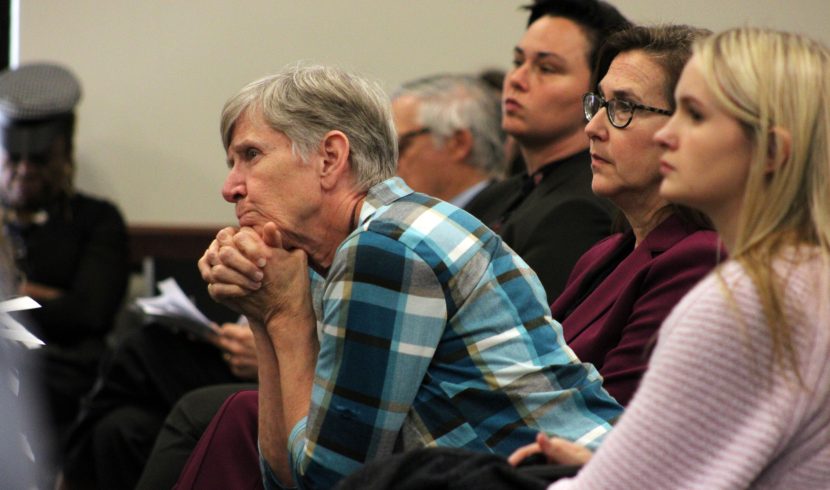Speakers ranged from a teenager whose father was brutally killed to a retired lawyer whose father tried to reform Alabama’s prisons 40 years ago.
By Eddie Burkhalter, Appleseed Researcher

The Legislative Joint Prison Oversight Committee held a public hearing on December 13, 2023 in Montgomery (photo by Alexander Willis for Alabama Daily News).
For just over three minutes, 17-year-old MaKayla Mount stood before members of the Legislative Joint Prison Oversight Committee and told the story of her father’s brutal beating and strangulation death inside a protective custody cell at Easterling Correctional Facility on Mother Day 2023. She arrived in Montgomery carrying her father’s remains in an urn.
“When you see your dad for the first time in 10 years and half of his face is almost gone because he was beaten, it does something to you,” Ms. Mount said during Wednesday’s public hearing of the Prison Oversight Committee. She was among fourteen Alabama families and advocates who spoke to lawmakers about Alabama’s broken prison system, many telling stories of their loved ones dying behind bars, being beaten and family members extorted, and of the indifference of wardens and officers hired to keep their loved ones alive.

MaKayla Mount holds an urn containing her father’s ashes at the Prison Overrsight Committee’s public hearing. 17-year-old Maykala testified about her father Christopher Mount’s brutal beating and strangulation death inside a protective custody cell at Easterling Correctional Facility on Mother Day 2023 (photo by Eddie Burkhalter).
MaKayla was not permitted to carry the urn to the podium as she, a teenager barely five feet tall, addressed elected officials about the hardest challenge in her young life. “My dad will never get to see me graduate. Never get to see me get married. Never get to see me graduate college. Have kids. That was taken from me,” Ms. Mount said. Correctional officers are supposed to be watching those suicide cells, but none were when her father was attacked and killed, she said.
William Smith beat and then strangled to death Christopher Mount, who was 44, in that cell, according to ADOC. Mr. Mount’s death certificate lists his cause of death as asphyxiation. Smith, 48, was incarcerated after being convicted of choking his girlfriend to death in 2017. Smith is believed to have killed himself 20 days after Mr. Mount’s death. Mr. Mount had served almost 17 years of a 30-year sentence after pleading guilty to a string of crimes in 2005 and 2006, all motivated by substance use.
“My son was raped in February of this year and it took them over a month to get him moved,” one mother told the lawmakers. About three weeks after being moved from Donaldson Correctional Facility to Bullock, some of the men who raped her son at Donaldson arrived at Bullock, she said. “He has spent a lot of time fighting and defending himself, but he’s only going to get written up for defending himself, and then that will have an effect on him when he comes up for parole again,” she said. Appleseed is protecting her identity because of threats to her son’s life and ADOC’s inability to keep him safe. Her son is incarcerated because of an offense that occurred when he was 17 years old.
Her son “has had everything happen to him but be killed” and she had to close her business because of threats she received from other incarcerated men “because they know I make cash money and they know where I live because it’s just that small and people talk.”
No Alabama Department of Corrections staff appeared to be in attendance at Wednesday’s meeting, one speaker noted, even though it was a statutorily mandated public hearing.
When it was Pam Moser’s turn to speak, the Birmingham nurse detailed the injuries her son, Brian Rigsby, sustained after an attack at Bullock Correctional Facility. Mr. Rigsby died on Oct. 4, before Ms. Moser’s application for medical furlough for her son, who was also suffering from liver failure, could be processed. He was 46.
As a child, Brian Rigsby was diagnosed with bipolar disorder. Substance abuse plagued his adult life, resulting in a life sentence after pleading guilty in 2007 to robbery in which no one was physically harmed. A string of prior non-violent convictions were linked to his addiction and resulted in the life sentence.
Ms. Moser and her son’s father, Mitchell Rigsby, visited their son at Bullock in August, as they did each month, she told committee members. “Brian had called a few days earlier and said he’d been hurt. The left side of Brian’s face was swollen and discolored. He had an open stab wound on his left calf which was red and swollen. I counted five lacerations on his head,” Ms. Moser said. “Four days later, long enough for sepsis to set in, Brian was finally hospitalized with a skull fracture, a facial fracture, rib fracture, a stab wound and teeth knocked out.”

Pam Moser and Mitchell Rigsby stand outside the Statehouse. Ms. Moser testified about her son Brian Rigsby’s death in September 2023 while in custody (photo by Elliot Spillers).
The warden told Ms. Moser that no report on Brian’s attack had been filed and told Ms. Moser “I don’t know how we let Brian get by us.” Yet, over and over again at the hearing, families told of severely injured and dying loved ones who were ignored or mistreated by high-level officials in the ADOC, the state’s largest law enforcement agency.
Brian was released but was hospitalized again on Sept. 13, Ms. Moser said, and she got a call from a hospital physician ten days later requesting the family visit with Brian because his condition was deteriorating. The family did visit with Brian in the hospital, but soon after the warden stopped those visits and Rigsby was taken to Staton Correctional Facility, where a warden told her: “Brian is doing better and he was placed on comfort care.” Ms. Moser, who has worked as a hospice nurse, explained to the warden that the change in care meant that her son was dying.
“Warden Babers said ‘We’re all dying,’” Ms. Moser told the committee. “We were not allowed to see Brian the last seven days of his life. We called daily to tell him we loved him and were trying to get a visit. We don’t know if he got any of those messages, and if he did, was there any response.”
The federal government in December 2020, sued the state and the Department of Corrections alleging that the state “fails to provide adequate protection from prisoner-on-prisoner violence and prisoner-on-prisoner sexual abuse, fails to provide safe and sanitary conditions, and subjects prisoners to excessive force at the hands of prison staff.” That lawsuit is scheduled for trial in November, 2024.
Another speaker, Birmingham lawyer Edward Friend, shared grim historical context. In the 1970s, U.S. District Court Judge Frank Johnson placed the Alabama prison system under federal oversight for 13 years and issued what, at the time, was the most detailed and sweeping remedial order to correct blatant constitutional violations. Judge Johnson appointed an oversight committee to monitor the State’s implementation of his order.
“My father was a member of that 1976 committee. A toughened veteran of World War II who witnessed unspeakable horror and participated in the Normandy landing, he was shocked to the core with the persuasive cruelty and violence (in Alabama prisons),” Mr. Friend told the legislative committee. “Let’s fast forward 48 years. I feel like it’s 1976 again. This son of that military veteran, his friends and neighbors, all are shocked to the core by the local and national newspaper headlines that scream about our prison atrocities, the excessive force by guards as well as inmate on on inmate assaults up 41% in 2023; shocked that we have more inmate murders in the country by a factor of five, shocked that the Department of Justice based on a mountain of evidence declares ADOC is “deliberately indifferent” to violence that permeates our prisons.”
While the crisis in Alabama’s overpopulated, understaffed prisons continues to grow, the number of people being incarcerated in the state is as well.
Alabama had the 12th highest rate of increase in the number of people incarcerated in state prisons between 2021 and 2022, with a nearly six percent increase in that time, according to a November report by the U.S. Department of Justice’s Bureau of Justice Statistics.
Only 10 states had a higher rate of imprisonment than Alabama in 2021, and only eight had higher rates in 2022, according to the federal data.
Deaths in Alabama prisons are expected to reach a record high for a second straight year in 2023. Alabama prisons saw a 34 percent increase in deaths between 2021 and 2022, according to the federal data, although the U.S. Department of Justice’s 252 deaths in 2022 is less than what Appleseed and The Montgomery Advertiser confirmed through the Alabama Department of Corrections to be 270 deaths that year, which would put the increase at 43 percent.
Exacerbating the crisis, parole rates have also plummeted in recent years, others spoke to the committee about, as reported by Alabama Daily News. Paroles in Alabama dropped from more than 50 percent in 2018 to less than 8 percent this year.






Leave a Reply
Want to join the discussion?Feel free to contribute!